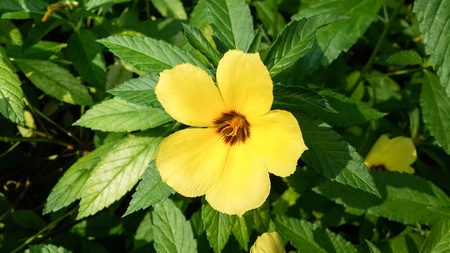Damiana - Turnera diffusa

Common Names: Damiana, Mexican Damiana, Mexican Holly, Turnera aphrodisiaca, Turnera diffusa, Herba de la Pastora, Old Woman's Broom, Aphrodisiac Turnera, Latin: Turnera diffusa, Global: Damiana
Latin Name: Turnera diffusa
Origin: Africa, South America, North America
Short Introduction
In temperate regions, Damiana can only be cultivated in pots and should always be brought indoors during cooler seasons (in summer, it's better to place it in a greenhouse if nights are chilly). The temperature should not drop below 16°C, or the plant will lose its leaves. Damiana requires plenty of light and does not tolerate shade. Water regularly. It thrives with fertilization—weekly during the summer, and once every three weeks in winter is sufficient.
Detailed Description
The magical plant Damiana – a natural aphrodisiac for women
Botanical Information
Damiana is a small shrub with a densely branched stem and many lateral branches. Its leaves are smooth, oval, and pleasantly soft to the touch. The upper surface is light, while the veins on the underside are finely hairy. The flowers are yellowish and have a scent strongly reminiscent of chamomile due to the presence of essential oils. They grow from the leaf axils and have a slightly bitter taste. Damiana usually blooms at the beginning or end of summer, producing small, oval capsules. The flavor of the capsules is similar to that of figs.
Origin and Distribution
Damiana originates from Central and South America, where it was first recorded by Spanish missionaries. They described Mexican Indians drinking a beverage made from Damiana leaves mixed with sugar, used both as a relaxing remedy and as an aphrodisiac. Today, Damiana is cultivated in southern North America (mainly Mexico and parts of Texas) as well as in Central America. It has also been introduced and is artificially grown in Africa, where it thrives best in savanna and desert environments.
Usage / Dosage
The traditional use of Damiana dates back to the Mayan civilization, whose people were aware of its exceptional aphrodisiac effects. Spanish records from the colonial era mention women drinking this honey-sweetened beverage several minutes before intimacy to enhance the experience of lovemaking. Drinking Damiana can be beneficial for both men and women. For women (according to reports), it helps those who struggle to achieve climax. While Damiana’s immediate effect lasts approximately half an hour to two hours, the full benefits are evident only with repeated and regular use. Other herbals recommend consuming Damiana one to two hours before intercourse and suggest that effects can be enhanced when paired with saw palmetto berries. Damiana has been used in spiritual ceremonies and is regarded as a magical plant, particularly in love rituals.
Damiana is well known for use in spiritual rituals, likely due to its ability to relieve stress and promote emotional well-being. Because of these qualities, it is valued as a relaxing herb. Turnera diffusa supports sexual health and helps maintain healthy sexual relationships.
Damiana also supports cognitive and mental activities. Cognitive functions are fundamental for perceiving the world around us, processing and reacting to information, understanding, reasoning, verbal expression, memory, attention, and concentration.
It helps maintain normal blood sugar levels.
It is also used for its potential to support healthy weight management.
Active Compounds
Damiana leaves contain a variety of compounds. These include arbutin, phenolic glycosides, and terpenoids. Qualitative analyses have identified specific compounds such as damianin, tetraphyllin B, gonzalitosin I, tricosan, acacetin, p-cymene, beta-sitosterol, cineole, apigenin, beta-carotene, alpha-pinene, beta-pinene, eucalyptol, tannin, thymol, hexacosanol, sesquiterpenoids, triterpenoids, and the polyterpene ficaprenol. Also present are fatty acids, caffeine, cyanogenic glycosides, and 22 different flavonoids.
Traditional Dosage
Use 1–2 tablespoons (or 5–10g by weight) of dried Damiana leaf. Pour about 250 ml of boiling water over the leaves and let steep for 10–15 minutes. Sweeten or flavor to taste.
Warning: Not recommended for pregnant or breastfeeding women, or children.


